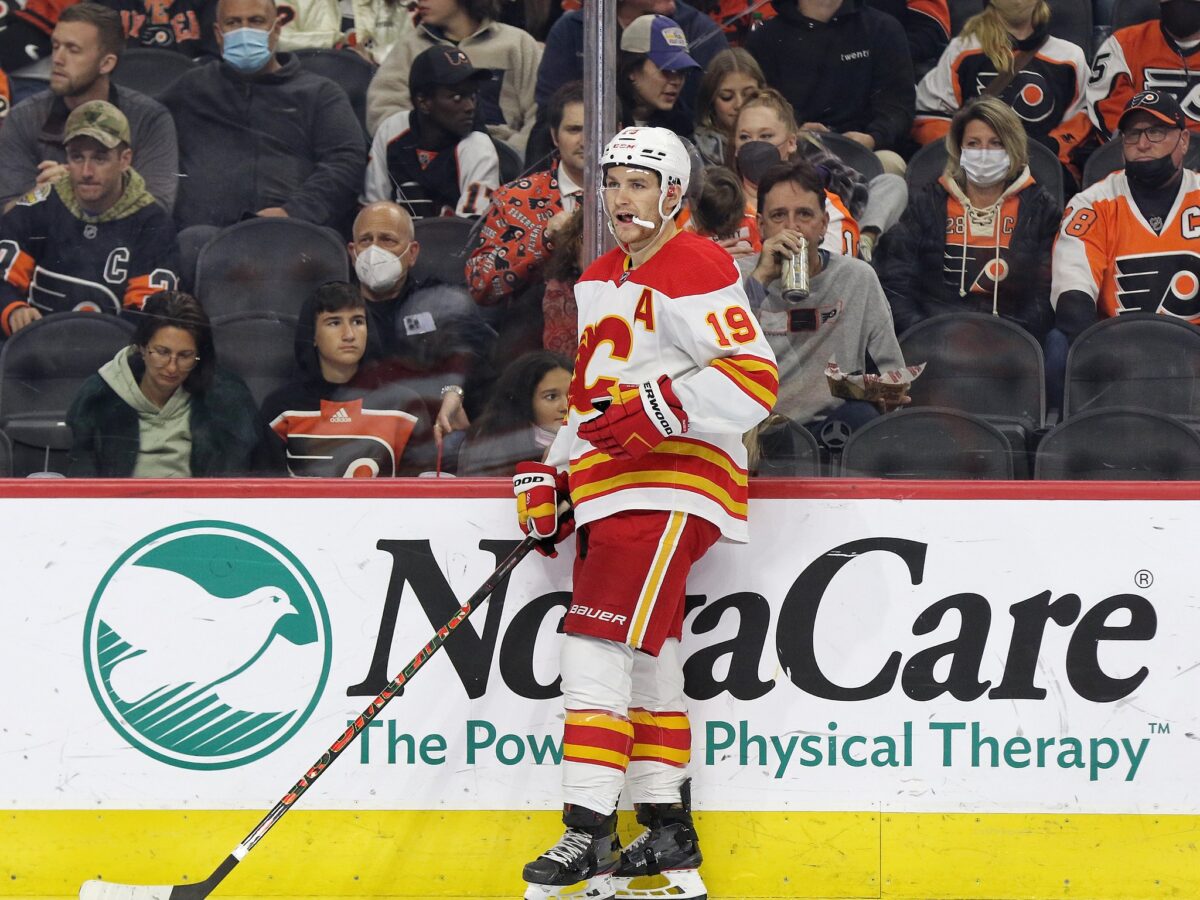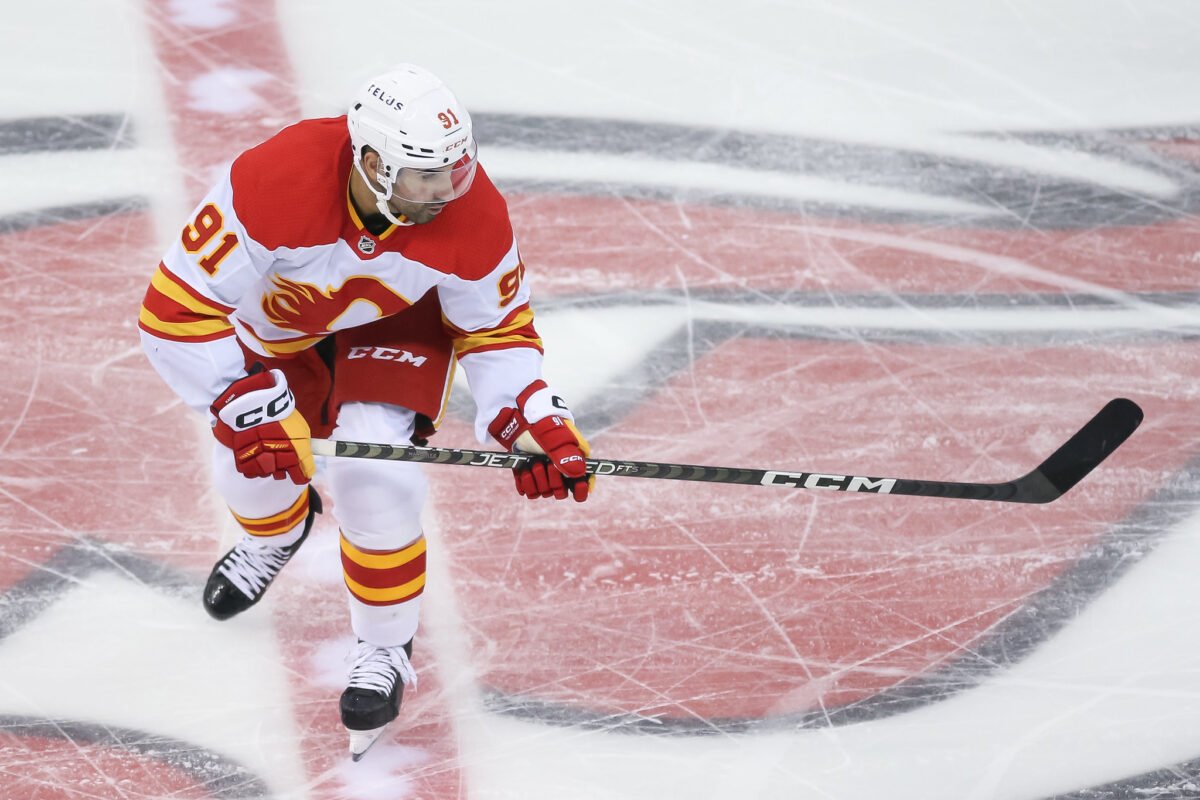Here we are, roughly 25% through the 2022-23 NHL season, and the Calgary Flames still have many things to figure out. The team started hot, with five wins in their first six games but have crash-landed with a dismal 6-9-3 record in the 18 games since. The goaltending and offence have been struggling; the team averages 3 goals per game (20th in the league) and 3.04 goals-against per game (tied for 21st in the league). After one of the busiest offseasons in franchise history, many fans and analysts expected better results at this point. Instead, the on-ice chemistry from last season’s Pacific Division-winning team has been missing.
This offseason, management either failed to re-sign or traded away franchise stalwarts Matthew Tkachuk, Johnny Gaudreau, and Sean Monahan. All three had played in Calgary for their entire NHL careers and now find themselves donning other teams’ sweaters. To substitute their losses, the team brought in Jonathan Huberdeau, Nazem Kadri, and Mackenzie Weegar, among others. Even so, they are playing sub-500 hockey and are one of only two teams (the lowly Chicago Blackhawks being the other) that don’t have a single player with 20 points or more. Therefore, it is time to have a look at arguably the Flames’ three largest moves from last summer and see how they have positively or negatively impacted the 2022-23 team.
Trading Tkachuk for Huberdeau, Weegar
Let’s get this out of the way first: many critics determined the Flames to be unofficial “winners” of this deal. After 24 games, however, the tables have turned. To recap: the Flames jettisoned Tkachuk and a conditional fourth-round draft pick in 2025 to the Florida Panthers for Huberdeau, MacKenzie Weegar, prospect Cole Schwindt and a conditional first-round pick in 2025. Tkachuk wanted out, Huberdeau had just come off of a career-high 115-point season, and Weegar was playing on the Panthers’ top defence pairing with Aaron Ekblad. Everything checked out well for Calgary.

However, Tkachuk is blossoming in the Sunshine State, with 32 points in 22 games and a winning record. Huberdeau has only mustered 13 points in 21 games, and Weegar just 6 in 24. Both players have looked out of sorts at times, and rightfully so, given the drastic changes they are likely experiencing. However, Tkachuk is in the same boat and has performed well. Schwindt has looked the best of the three, putting up 13 points in 17 games with the Flames’ American Hockey League affiliate, the Calgary Wranglers. There is a lot of the season left for Huberdeau and Weegar to further settle in, but so far, this trade hasn’t aged as well for the Flames.
Sean Monahan to the Habs
Calgary’s sixth-overall pick in the 2013 Draft, Sean Monahan, began his pro career by scoring at least 22 goals in seven straight seasons for the Flames. Unfortunately, he then battled injuries for two seasons, lost a step, and totalled 51 points in 115 games while also finding himself a frequent healthy scratch. He wasn’t earning the $6.375 million he was due, and the team had to do something after Tkachuk’s departure, and Gaudreau signed with the Columbus Blue Jackets.
Related: 3 Calgary Wranglers That Should Be Exciting Flames Fans
Monahan was moved to the Montreal Canadiens with a conditional first-round pick for future considerations. The Canadiens will receive one of Calgary’s 2024, 2025, or 2026 firsts or the aforementioned Florida pick, depending on a multitude of conditions.
The trade was a classic cap dump in which a team sacrifices an asset to gain salary flexibility while the other team takes on the hefty price tag. Yet, Monahan has outperformed the cap dump by putting up a respectable 16 points in 24 games for the Canadiens, who also have a winning record at this point. His veteran presence and play down the middle have also given the team a solid centre core alongside Nick Suzuki and Christian Dvorak. His 55% winning rate in the face-off dot would be leading the Flames if he was still a member. Few likely predicted that Monahan would be producing at a 55-point pace and making a big impact so quickly. Still, Flames management would likely make this move again in hindsight.
Naz Moves North
The Flames, of course, used the freed-up cap space from the Monahan deal to sign one of if not the top free agents available, centre Nazem Kadri. The 31-year-old pivot had just come off of a Stanley Cup win with the Colorado Avalanche and a successful regular season in which he totalled a career-high 87 points in just 71 games. He added 15 points in 16 playoff games, including two game-winning goals. He and his agent held out until mid-August before coming to terms with a team, likely because not many had the money to acquire his rights. He seemingly got what a player in his position was worth: a seven-year, $49 million contract for a quality two-way top-six centreman was considered fair value.

Fast forward 24 games, and Kadri has 16 points, a minus-six rating, and a 46% face-off win percentage. Ironically, he is also on pace for 55 points, which would amount to a 32-point drop-off in production. On the surface, Kadri’s play might not be worth $7 million, but critics have to remember some key facts before coming to a conclusion. Like Huberdeau and Weegar, Kadri is likely in a “settling in” period, becoming accustomed to his new location and teammates. Additionally, before last season’s breakout campaign, he averaged 52 points per 82 games and hadn’t scored more than 61 in a season, so it may be unfair to expect him to replicate his most recent performance.
You may also like:
- NHL Rumors: Huberdeau Out, Panarin Shuns Huge Offer, Oilers Changes
- NHL Morning Recap – February 5, 2026
- Flames’ Nazem Kadri Open to Trade: Where Could He Land?
- NHL Rumors: Rielly Trade, More on McMann to Oilers, Latest on Panarin
- Calgary Flames Retired Numbers
All in all, whether or not the Flames made the right calls with these moves is still uncertain. Huberdeau, Weegar, and Kadri will undoubtedly get better after more and more reps with the team, which should make Tkachuk’s and Monahan’s strong seasons hurt fans a bit less. Perhaps it was an oversight to think the team would perform similarly or better than that of the 50-win team from last season after so many adjustments. However, there are plenty of games left and much room for improvement.